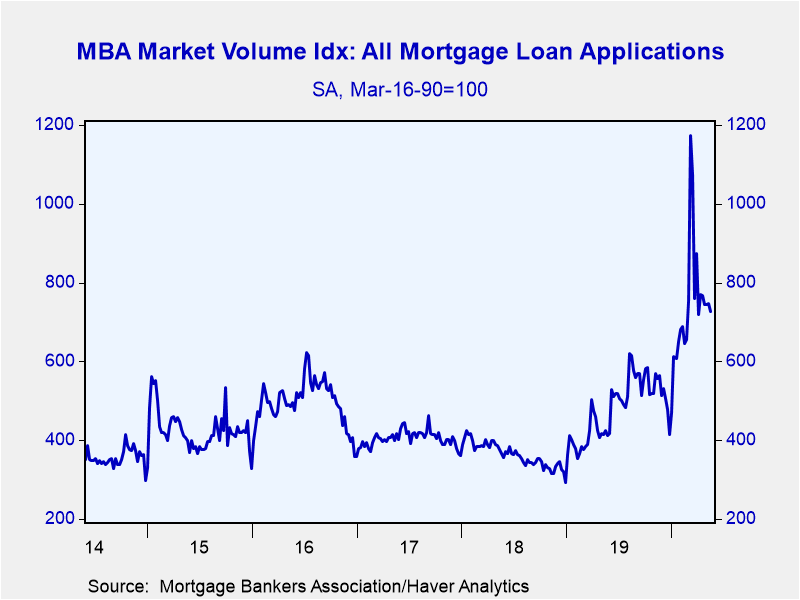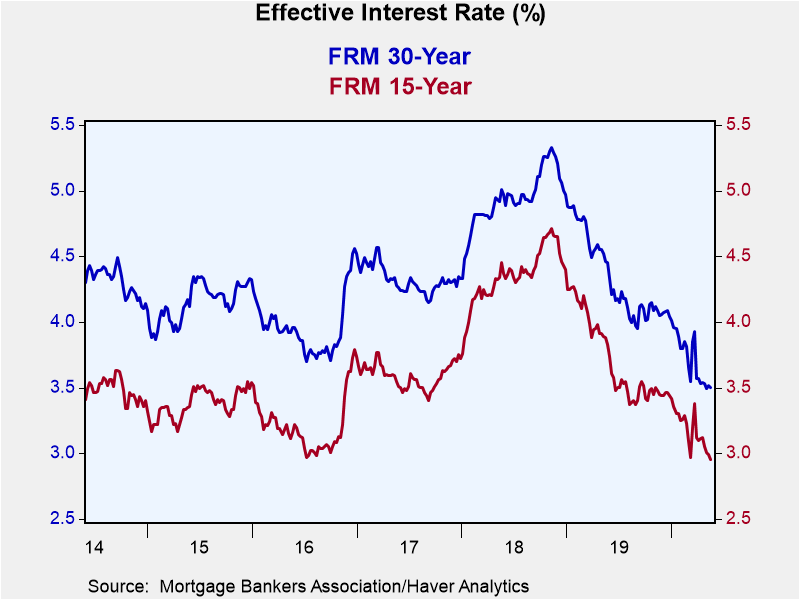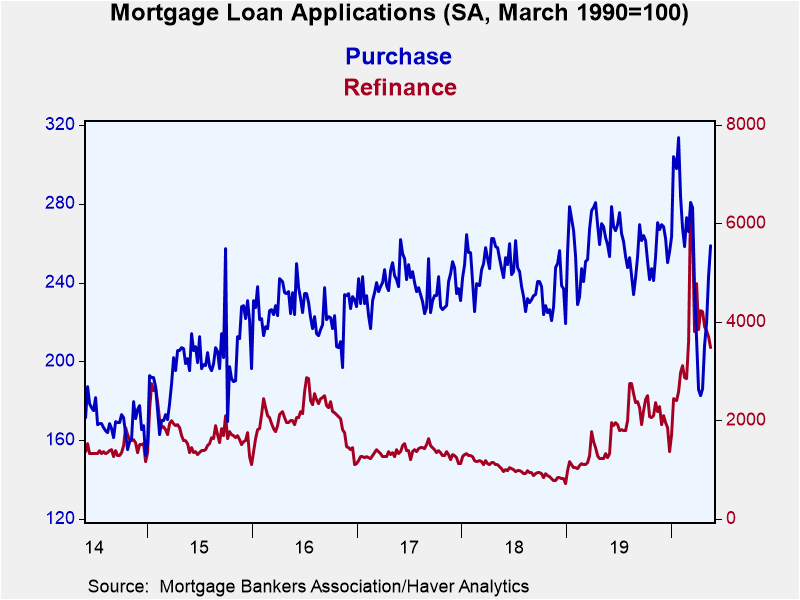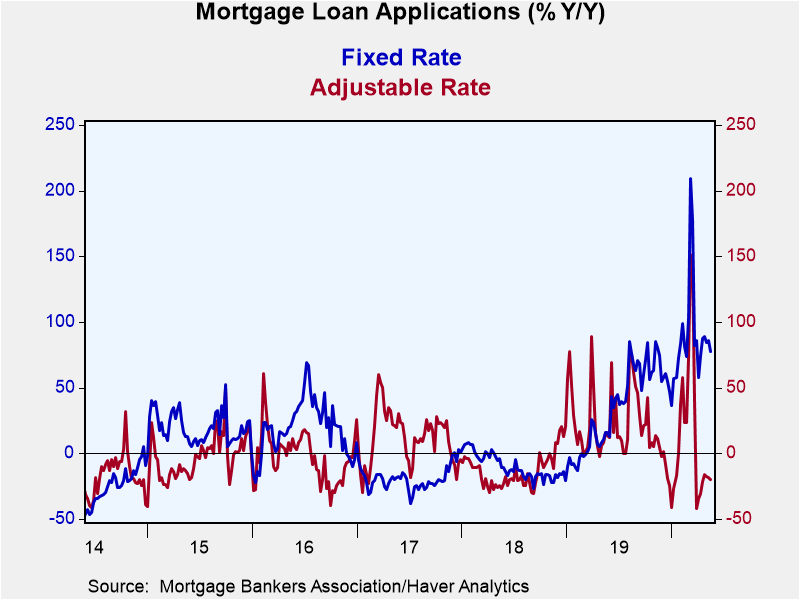 Global| May 20 2020
Global| May 20 2020U.S. Mortgage Applications Decline As Rates Are Little Changed
by:Tom Moeller
|in:Economy in Brief
Summary
• Refinancings plummet but purchases surge. • Home buyers lock in low financing rates. The Mortgage Bankers Association reported that its Mortgage Loan Application Index fell 2.6% (+64.0% y/y) last week following negligible increases [...]
• Refinancings plummet but purchases surge.
• Home buyers lock in low financing rates.
The Mortgage Bankers Association reported that its Mortgage Loan Application Index fell 2.6% (+64.0% y/y) last week following negligible increases during the prior two weeks.
A 6.3% decline (+160.3% y/y) in applications to refinance loans pulled the total lower. Purchase applications surged, however, by 6.4% (-1.5% y/y) as the economy began to open up after the coronavirus shutdowns. Interest rates have remained low throughout the period.
The refinancing share of mortgage activity fell to 64.3% of total applications, down from 76.2% early last month. Just 3.2% of total loans were adjustable-rate mortgages as a percent of total applications.
The effective interest rate on a 15-year fixed-rate mortgage eased to 2.95% last week from 2.99% in the previous week. This rate remained close to the all-time low (dating back to 1990). The effective interest rate on the 30-year fixed-rate mortgage edged two basis points lower to a near record low. It was down from a high of 3.93% in mid-March. The effective rate on a 30-year Jumbo mortgage edged down to 3.77% from a high of 3.95% in early-April. The rate on the 5-year adjustable rate mortgage dropped sharply to 3.17% from a high of 4.61% in October 2018.
The average mortgage loan size eased to $310,600 from $313,600. The average loan size of refinancings fell to $299,400 from an early-March high of $372,100. The average loan size for purchases declined w/w to $330,700.
Home buyers and owners continue to lock in currently low levels of interest rates. Applications for fixed-rate loans increased 77.4% y/y, while applications for adjustable rate loans fell 19.7% y/y.
The survey covers over 75% of all U.S. retail residential mortgage applications and has been conducted weekly since 1990. Respondents include mortgage bankers, commercial banks and thrifts. The base period and value for each index is March 16, 1990=100. The figures for weekly mortgage applications and interest rates are available in Haver's SURVEYW database.
The minutes to the latest FOMC meeting are available here.
| MBA Mortgage Applications (%, SA) | 05/15/20 | 05/08/20 | 05/01/20 | Y/Y | 2019 | 2018 | 2017 |
|---|---|---|---|---|---|---|---|
| Total Market Index | -2.6 | 0.3 | 0.1 | 64.0 | 32.4 | -10.4 | -17.8 |
| Purchase | 6.4 | 10.6 | 5.8 | -1.5 | 6.6 | 2.1 | 5.6 |
| Refinancing | -6.3 | -3.3 | -1.7 | 160.3 | 71.1 | -24.3 | -34.0 |
| 15-Year Effective Mortgage Interest Rate (%) | 2.95 | 2.99 | 3.01 | 3.88 | 3.71 | 4.35 | 3.59 |
| 30-Year Effective Mortgage Interest Rate (%) | 3.50 | 3.52 | 3.49 | 4.46s | 4.34 | 4.94 | 4.32 |
Tom Moeller
AuthorMore in Author Profile »Prior to joining Haver Analytics in 2000, Mr. Moeller worked as the Economist at Chancellor Capital Management from 1985 to 1999. There, he developed comprehensive economic forecasts and interpreted economic data for equity and fixed income portfolio managers. Also at Chancellor, Mr. Moeller worked as an equity analyst and was responsible for researching and rating companies in the economically sensitive automobile and housing industries for investment in Chancellor’s equity portfolio. Prior to joining Chancellor, Mr. Moeller was an Economist at Citibank from 1979 to 1984. He also analyzed pricing behavior in the metals industry for the Council on Wage and Price Stability in Washington, D.C. In 1999, Mr. Moeller received the award for most accurate forecast from the Forecasters' Club of New York. From 1990 to 1992 he was President of the New York Association for Business Economists. Mr. Moeller earned an M.B.A. in Finance from Fordham University, where he graduated in 1987. He holds a Bachelor of Arts in Economics from George Washington University.
More Economy in Brief
 Global| Feb 05 2026
Global| Feb 05 2026Charts of the Week: Balanced Policy, Resilient Data and AI Narratives
by:Andrew Cates










